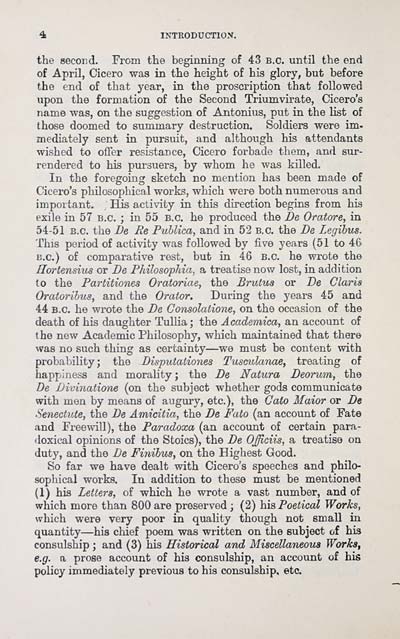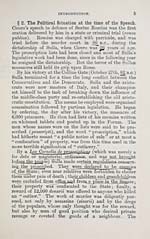Download files
Complete book:
Individual page:
Thumbnail gallery: Grid view | List view

4 INTRODUCnON.
the aecond. From the beginning of 43 b.o. until the end
of April, Cicero was in the height of his glory, but before
the end of that year, in the proscription that followed
upon the formation of the Second Triumvirate, Cicero's
name was, on the suggestion of Antonius, put in the hst of
those doomed to summary destruction. Soldiers were im-
mediately sent in pursuit, and althoiigh his attendants
wished to ofFer resistance, Cicero forbade them, and sur-
rendered to his pursuers, by whom he was killed.
In the foregoing sketch no mention has been made of
Cicero's philosophical works, which were both numerous and
impoitant, His activity in this direction begins from his
exile iu 57 b.c. ; in 55 b.c. he produced the De Oratore, in
54-51 B.c. the Be Re Publica, and in 52 b.c. the De Legihus.
This period of activity was followed by five years (51 to 46
B.c.) of comparative rest, but in 46 b.c. he wrote the
Hortensius or De Philosophia, a treatise now lost, in addition
to the Partitiones Oratoriae, the Brutus or De Claris
Oratoribus, and the Orator. During the years 45 and
44 B.c. he wrote the De Consolatione, on the occasion of the
death of his daughter Tullia; the Academica, an account of
the new Academic Philosophy, which maintained that there
was no such thing as certainty — we must be content with
probability; the Disputationes Tuscidanae, treating of
happiness and morality; the De Natura Deorum, the
De Divinatione (on the subject whether gods communicate
with men by means of augury, etc), the Cato Maior or De
Senectute, the De Amicitia, the De Fato (an account of Fate
and Freewill), the Paradoxa (an account of certain para-
doxical opinions of the Stoics), the De Officiis, a treatise oa
duty, and the De Finibus, on the Highest Good.
So far we have dealt with Cicero's speeches and philo-
sophical works. In addition to these must be mentioned
(1) his Letters, of which he wrote a vast number, and of
which more than 800 are preserved ; (2) hiaPoetical Works,
which were very poor in quality though not small in
quantity — his chief poem was written on the subject of his
consulship ; and (3) his Historical and Miscellaneous Works,
e.g. a prose account of his consulship, an account of his
policy immediately previous to his consulship. etc.
the aecond. From the beginning of 43 b.o. until the end
of April, Cicero was in the height of his glory, but before
the end of that year, in the proscription that followed
upon the formation of the Second Triumvirate, Cicero's
name was, on the suggestion of Antonius, put in the hst of
those doomed to summary destruction. Soldiers were im-
mediately sent in pursuit, and althoiigh his attendants
wished to ofFer resistance, Cicero forbade them, and sur-
rendered to his pursuers, by whom he was killed.
In the foregoing sketch no mention has been made of
Cicero's philosophical works, which were both numerous and
impoitant, His activity in this direction begins from his
exile iu 57 b.c. ; in 55 b.c. he produced the De Oratore, in
54-51 B.c. the Be Re Publica, and in 52 b.c. the De Legihus.
This period of activity was followed by five years (51 to 46
B.c.) of comparative rest, but in 46 b.c. he wrote the
Hortensius or De Philosophia, a treatise now lost, in addition
to the Partitiones Oratoriae, the Brutus or De Claris
Oratoribus, and the Orator. During the years 45 and
44 B.c. he wrote the De Consolatione, on the occasion of the
death of his daughter Tullia; the Academica, an account of
the new Academic Philosophy, which maintained that there
was no such thing as certainty — we must be content with
probability; the Disputationes Tuscidanae, treating of
happiness and morality; the De Natura Deorum, the
De Divinatione (on the subject whether gods communicate
with men by means of augury, etc), the Cato Maior or De
Senectute, the De Amicitia, the De Fato (an account of Fate
and Freewill), the Paradoxa (an account of certain para-
doxical opinions of the Stoics), the De Officiis, a treatise oa
duty, and the De Finibus, on the Highest Good.
So far we have dealt with Cicero's speeches and philo-
sophical works. In addition to these must be mentioned
(1) his Letters, of which he wrote a vast number, and of
which more than 800 are preserved ; (2) hiaPoetical Works,
which were very poor in quality though not small in
quantity — his chief poem was written on the subject of his
consulship ; and (3) his Historical and Miscellaneous Works,
e.g. a prose account of his consulship, an account of his
policy immediately previous to his consulship. etc.
Set display mode to: Large image | Transcription
Images and transcriptions on this page, including medium image downloads, may be used under the Creative Commons Attribution 4.0 International Licence unless otherwise stated. ![]()
| Early Gaelic Book Collections > Matheson Collection > Pro S. Roscio Amerino > (12) |
|---|
| Permanent URL | https://digital.nls.uk/76502464 |
|---|
| Description | Items from a collection of 170 volumes relating to Gaelic matters. Mainly philological works in the Celtic and some non-Celtic languages. Some books extensively annotated by Angus Matheson, the first Professor of Celtic at Glasgow University. |
|---|
| Description | Selected items from five 'Special and Named Printed Collections'. Includes books in Gaelic and other Celtic languages, works about the Gaels, their languages, literature, culture and history. |
|---|

